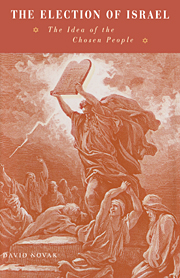Book contents
- Frontmatter
- Contents
- Preface
- List of abbreviations
- General note
- Introduction
- 1 Spinoza and his challenge
- 2 Hermann Cohen's concept of election
- 3 Franz Rosenzweig's return to the doctrine
- 4 The retrieval of the biblical doctrine
- 5 The rabbinic development of the doctrine
- 6 Two medieval views of election
- Conclusion
- Appendix 1 Some major Jewish thinkers cited
- Appendix 2
- Appendix 3
- Appendix 4
- Bibliography
- Index
4 - The retrieval of the biblical doctrine
Published online by Cambridge University Press: 18 December 2009
- Frontmatter
- Contents
- Preface
- List of abbreviations
- General note
- Introduction
- 1 Spinoza and his challenge
- 2 Hermann Cohen's concept of election
- 3 Franz Rosenzweig's return to the doctrine
- 4 The retrieval of the biblical doctrine
- 5 The rabbinic development of the doctrine
- 6 Two medieval views of election
- Conclusion
- Appendix 1 Some major Jewish thinkers cited
- Appendix 2
- Appendix 3
- Appendix 4
- Bibliography
- Index
Summary
SCRIPTURE AND PHILOSOPHICAL ANALYSIS
More than any other modern Jewish thinker Franz Rosenzweig has enabled contemporary Jews to retrieve philosophically the biblical doctrine of the election of Israel. This is because Rosenzweig has enabled us to retrieve philosophically the Bible itself, to retrieve it at its most essential level: its presentation of the relationship with God. Thus he began the process of overcoming Spinoza. That, as we have already seen, is the historical precondition for our contemporary retrieval of the doctrine. For although even Spinoza agreed with the Bible that the relationship with God is the most important human concern, he rejected the Bible's assumption that its covenantal reality is the primary locus of that relationship. Instead, Spinoza insisted that the primary locus of that relationship lies in nature and only secondarily in anything historical. To be sure, Rosenzweig did not directly argue against Spinoza himself, but rather against Spinoza's assumption as it came to be accepted in Idealist philosophy. In this philosophy, even God's relationships are all part of a larger system that ultimately includes everything. Consequently, the election of Israel by God, which is certainly the leitmotif in the Bible, had to be radically deconstructed, as we have already seen. Rosenzweig argued and demonstrated that if there is to be any authentic relationship with God, the Bible and all that it entails must be its primary locus. The beginning of this retrieval, the ground clearing for it, as it were, can be seen in The Star of Redemption.
- Type
- Chapter
- Information
- The Election of IsraelThe Idea of the Chosen People, pp. 108 - 162Publisher: Cambridge University PressPrint publication year: 1995



